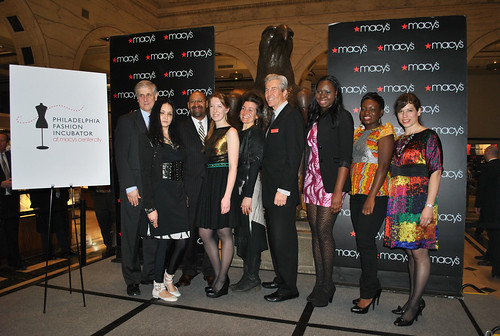
The Philadelphia Fashion Incubator comes to fruition after two years of planning, as students work beside established designers.
During the past several years, the Philly fashion scene has blossomed into a thriving organism.
With events like Philly Fashion Week, boutiques opening throughout the city, and designers including Carmelita Couture working directly out of Philly, the city is on the road to becoming a fashion destination.
With several renowned fashion design schools in the city, and countless others in the surrounding area, Philly needs to foster the talented designers who are educated here. To do so, the city of Philadelphia, Macy’s and several other organizations joined forces to create the Philadelphia Fashion Incubator, which got its start two years ago.
“I feel something amazing is happening in the city, and I’m so happy to be [one of] the first,” said Autumn Kietponglert, the Drexel graduate chosen to participate in the Incubator. “[The fashion industry] is emerging, it’s becoming. It’s growing, and the beginning is always the most interesting part.”
Essentially, the program is designed to educate recently graduated design students on how to interact with media, mass market their clothing lines and do so using a solid business plan. Each of the three main Philadelphia design schools, Drexel University, Philadelphia University and Moore College of Art and Design nominated a recent graduate. There was also a “wild card” spot available for a designer in the tri-state area, who is given the same opportunity as a college graduate, without the degree requirement.
After a rigorous two-month interview process, the president of Macy’s and Mayor Michael Nutter announced Drexel’s Kietponglert, Moore College’s alumna Melissa D’Agostino, Philadelphia University’s nominee Kaitlyn Doherty and wildcards Latifat Obajinmi and Moriamo Johnson as the inaugural Philadelphia Fashion Incubator class of 2013.
Doherty said that after graduating, she didn’t feel able to run her own business.
“I started a handbag line in the summer, but I’ve never had any business experience,” Doherty said. “I’m hoping to have a business running [after the Incubator].”
Doherty, like many other design students, must face the reality of attempting to create a business model while still creating a line for each season, which could prove incredibly difficult without help from experienced people in the industry.
Although the class has only been working for a month or so, they’ve already worked with experienced fashion designers.
Kietponglert said that the Philadelphia-based label Nicole Miller invited them to visit its retail and wholesale operations.
“Normally you have to go to people, but we have people coming to us,” Kietponglert said.
In talking to the designers, I was very surprised that so many fashion and industry experts were willing to donate their time to help the program, but I failed to realize the economic impact the fashion incubator will have on the city.
Although we have many national clothing brands on Chestnut Street, we don’t have a one-stop shopping area for Philadelphia boutiques because they’re scattered throughout the city.
“We took on the idea of marketing Center City to the retail industry,” Philadelphia Fashion Incubator board member and Temple alumna, Michelle Shannon, said. “Our brokers and retailers felt that outside of the immediate area, Philadelphia had an outdated area in the retail industry – people still thought of us as a blue collar market, not sophisticated.”
Using the incubator as a catalyst, Shannon plans to re-market the city as a manufacturing and retail destination. Philadelphia has potential to be a great fashion city not only because of its proximity to New York, but also its history of apparel manufacturing.
In the 1980s, many clothing manufacturing operations based in Philly moved overseas due to the rising cost of domestic apparel manufacturing. However, rising fuel prices and an increased popularity of the “Made in America” movement is slowly bringing manufacturing back to the U.S.
“We’re seeing more things coming back to the U.S. [because] it’s not as effective to produce [things] overseas as it used to be, and [when manufacturing overseas] the designers lose control,” Shannon said. “I would like to see artisanal manufacturing come back to Philadelphia in the apparel industry. It’s good all around for businesses, jobs, the environment and designers.”
When manufacturing overseas, designers must place bulk orders, sometimes ordering more products than necessary.
A department store buyer may only order a handful of outfits to place in select stores, which means the designer is stuck with overstock.
“[When manufacturing in Philadelphia,] you can almost manufacture to fill orders as they come in,” Shannon said. “Designers lose less because they aren’t eating all this stuff they can’t sell.”
Although manufacturing clothing locally benefits the designer because they have more control, there will be a serious trickle-down effect in other industries as well. Each new designer will need a retail space or showroom, a marketing team, a manufacturing team and a host of other employees, all of which would keep money circulating through the city.
After considering the extreme economic impact the incubator program could have on the city, I was incredibly excited about how the fashion industry could so positively affect Philly’s economy. Even though the program is set to foster design talent, it could actually grow Philly’s economy as a whole.
Mark Longacre can be reached at mark.longacre@temple.edu.


Be the first to comment